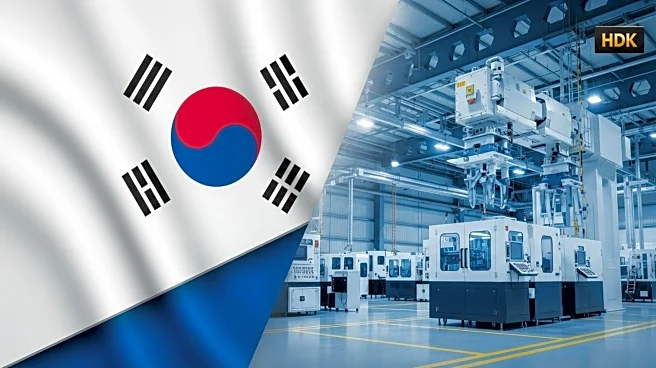What's Happening?
The United States has agreed to permit South Korean workers to enter the country on short-term visas or through a visa waiver program to assist in building industrial sites. This decision follows a significant immigration raid at a Hyundai battery factory in Georgia, where over 300 South Korean nationals were detained. The incident sparked outrage in South Korea, a key U.S. ally, especially after the country had committed substantial investments in the U.S. to avoid tariffs imposed by the Trump administration. The agreement was reached after bilateral talks in Washington, where U.S. officials confirmed that South Korean companies could use B-1 short-term business visas or the Electronic System for Travel Authorization (ESTA) to send workers for equipment installation, servicing, and repair. Despite this agreement, South Korea continues to push for a new visa category to facilitate skilled workers' access, though U.S. officials cited legislative constraints as a barrier to such changes.
Why It's Important?
This development is significant as it addresses the labor needs of South Korean companies investing in the U.S., particularly in the manufacturing sector. The agreement helps maintain the momentum of South Korean investments in the U.S., which are crucial for economic ties between the two nations. It also highlights the complexities of immigration policies affecting international business operations. The decision to allow short-term visas and waivers can potentially ease tensions between the U.S. and South Korea, ensuring that industrial projects proceed without further disruptions. However, the call for a new visa category underscores ongoing challenges in the U.S. immigration system, which could impact future foreign investments and workforce mobility.
What's Next?
South Korean companies, including LG Energy Solution, are expected to continue their operations in the U.S., with plans to normalize construction and factory operations. The U.S. and South Korea may engage in further discussions to explore more comprehensive visa solutions, although significant legislative changes appear unlikely in the near term. The situation may prompt other countries with similar investment interests in the U.S. to seek comparable agreements, potentially influencing broader immigration policy discussions.











